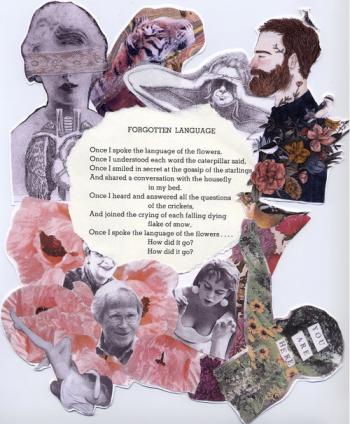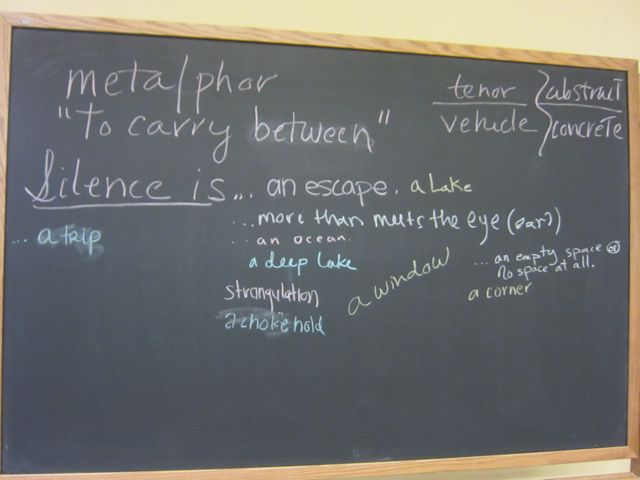Serendip is an independent site partnering with faculty at multiple colleges and universities around the world. Happy exploring!
Blogs

Planning Our Collective Ramble (Dec. 3)
We have agreed to share a collective ramble during class time next Monday, December 3. We will gather @ the Mill Creek restoration site, in Ashbridge Park (a 10-minute walk from campus); and design the day along the lines of the "dynamic structure" froggies315 proposed, dividing into groups of 2 or 3 each to
1) open and close the wander
2) locate us @ the site via some history
3) and also via some poetry
4) supply food to fuel our wandering off on our own
5) lead us before and after the day (on-line or in class) in reflection about what's happened.
In a comment to this post, please indicate which group you want to join. Attend to the comments before yours, and distribute yourself evenly...let's see if this works! We need to agree who will do what by classtime on Wednesday.
Thanks for working so ecologically!
A.
memo 2
I emailed my paper to Barb but forgot to post.
I used this image, which Howard Zehr used in his powerpoint. My paper was about how Zehr's work relates to our experiences in the Cannery and how photographic techniques, such as zooming in and zooming, have a similar effect to reframing the words we use to describe our experience in the Cannery.
\


Can I write in such a way that every time you read it, it tells a different story?
Short but interesting podcast with Maxine Hong Kingston: http://artworks.arts.gov/?p=13152

last minute coetzee alternative
HI everyone- I had been planning to do the reading by taking the book out of reserves but its been out each time I checked so I began to look for alternatives in case I didn't get a chance to at least look over the reading before class. I ended up finding the lecture that "the lives of animals" is based on, delivered by Coetzee during a series of lectures at Princeton. I believe from what I led it has similar themes and uses the same alter ego that Coetzee uses. I posted the link below, I hope that helps anyone having similar issues getting the reading!
tannerlectures.utah.edu/lectures/documents/Coetzee99.pdf

Planting a Garden of Ecological Literacy
This is a what-if paper. By writing this, I’m asking others to play the believe/doubt game along with me; I ask you to entertain these ideas in their possibilities but to retain a critical eye toward their infeasibilities.

Reclaiming Poetesses as Eco-feminist Figures

When I ran across the above image, the text of which is by children’s poet Shel Silverstein, I started thinking about when, exactly, we are able to break down the barrier between natural reality, and human expression of one’s perception of this reality. How do we go about recovering the language of the flowers, as Silverstein puts it?
In Wholeness and the Implicate Order, David Bohm suggests that we may be able to see a defragmentation in poetry. Poetry allows us to “overcome this fragmentation by using language in a freer, more informal, and ‘poetic’ way” (Bohm 34). The accuracy of this statement lies in the type of poetry analyzed.
Sonneteers such as Milton and Shakespeare typically used nature to describe the object of their affections. By attempting to use nature to as a descriptive, they stabilize both nature and the person they describe. They simultaneously define nature and their subject, settling both into a non-existent stability. Take, for example, the infamous Shakespearean sonnet, “Shall I compare thee to a summer's day?” In it, Shakespeare exclaims the beauties of his loved one, concluding the poem with the lines:
My Ecological Story
For our third Web Event I chose to expand the activity we did in class and answer some of the questions Carolyn Merchant poses. I think that the personal experience is the most valuable experience from which to draw on in an ecological class. The personal experience may not be shared by everyone, but it does highlight how each of our personal narratives is affected by someone else's thereby stressing the importance of interconnection.
Self in Society
“Consider your own family’s history and place in society going back at least to you grandparents’ generation. Were your ancestors native to this country? Are you or your parents first-, second-, or perhaps eighth-generation immigrants? What large events-wars, depressions, revolutions, social movements- shaped their lives? How did your families use the land and relate to nature? Which of their values have you absorbed? Which have you rejected? Think about the people you know and their family connections to the land” (Merchant, 1-2).

And now for a change of pace...
http://www.foxnews.com/opinion/2012/11/24/war-on-men/
While getting lost on the world wide webs I stumbled upon this... hm....Hard to believe it was written by a woman.
field notes 2
After I watched the girl sitting in front of me playing her online games all through the class, I started to doubt whether or not a computer class should be held in this loose tension. I have noticed from the very beginning of this placement that the teacher does not give any lectures and the class begins and ends in chaos as always. Is it because that this is a computer class which is not a traditional discipline course?
I interviewed the teacher afterwards and the teacher gave her answers as that first of all, many of students had already have those computer skills before they come into the class and secondly, sixth and seventh grade girls will probably not focus on her lecture for long.
In this classroom, there is no doubt that most of the students have access to computers and technical skills outside the class and according to the teacher, besides the transfer students, students in this school would receive the computer education from kindergarten. I agree that prosperous economic background of these students may bring them advantadges in utilizing computers but since if the kindergarten in this school has already provided the technique education, why the curriculum in middle school still stays in the same material? If the students were simply taking a break and surfing online randomly, school might need to reconsider the curriculum and the course arrangment, otherwise, the class would be a waste of time and resource.



